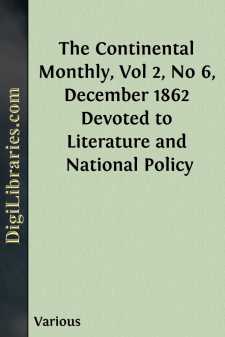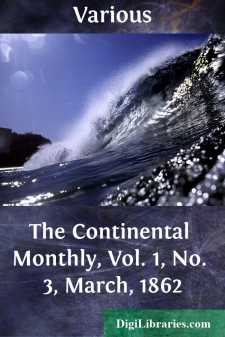Periodicals
- Art 27
- Children's periodicals 59
- Entertainment 5
- Food/Wine 2
- Games/Humor 455
- General
- Health 1
- History 53
- House/Home 1
- Regional 62
- Science/Nature 118
- Transportation 10
General Books
Sort by:
by:
Various
THE CAUSES OF THE REBELLION. No other nation was ever convulsed by an internal struggle so tremendous as that which now rends our own unhappy country. No mere rebellion has ever before spread its calamitous effects so widely, beyond the scene of its immediate horrors. Just in proportion to the magnitude of the evils it has produced, is the enormity of the crime involved, on one side or the other; and...
more...
by:
Various
THE UNION. III. On the 10th of April last, upon the recommendation of the President of the United States, Congress offered pecuniary aid to such States as would gradually abolish slavery within their limits. The colonization, from time to time, of the manumitted slaves, with their consent, by the Government, beyond our boundaries, was also contemplated as a part of the system. By the President's...
more...
by:
Various
TURKEY. The decline of the Turkish Empire has furnished an eloquent theme for historians, who have ever made it the 'point and commendation of their tale.' Judging from its decline, they have predicted its fall. Half a century ago, the historian of the middle ages expected with an assurance that 'none can deem extravagant,' the approaching subversion of the Ottoman power. Although...
more...
by:
Various
THE PROGRESS OF LIBERTY IN THE UNITED STATES. There are three classes of persons in the loyal States of this Union who proclaim the present civil war unnecessary, and clamor for peace at any price: first, a multitude of people, so ignorant of the history of the country that they do not know what the conflict is about; secondly, a smaller class of better-informed citizens, who have no moral...
more...
by:
Various
THE VALUE OF THE UNION. II. Having taken a hasty survey, in our first number, of the value and progress of the Union, let us now, turning our gaze to the opposite quarter, consider the pro-slavery rebellion and its tendencies, and mark the contrast. We have seen, in glancing along the past, that while a benevolent Providence has evidently been in the constant endeavor to lead mankind onward and upward...
more...
by:
Various
OUR WAR AND OUR WANT. Can this great republic of our forefathers exist with slavery in it? Whether we like or dislike the question, it must be answered. As the war stands, we have gone too far to retreat. It clamors for a brave and manly solution. Let us see if we can, laying aside all prejudices, all dislikes whatever, discover an honest course, simply with a view to preserve the Union and insure its...
more...
by:
Various
Southern Aids To The North. Perhaps the most difficult question at present before the American people is that so often and so insolently put by Southern journals, and so ignorantly babbled in weak imitation of them by English newspapers, asking what, after all, in case of a victory, or even of many victories, can we do with the revolted provinces? The British press, prompt to put the worst construction...
more...
by:
Various
The War Between Freedom And Slavery In Missouri. It is admitted that no man can write the history of his own times with such fullness and impartiality as shall entitle his record to the unquestioning credence and acceptance of posterity. Men are necessarily actors in the scenes amid which they live. If not personally taking an active part in the conduct of public affairs, they have friends who are, and...
more...
by:
Various
What Shall We Do With It? The first blood that was shed in our Revolutionary struggle, was in Boston, in March, 1770. The next at Lexington, in June, 1775. The interval was filled with acts of coercion and oppression on the one side and with complaints and remonstrances on the other. But the thought of Independence was entertained by very few of our people, even for some time after the affair at...
more...
by:
Various
THE CONSTITUTION AND SLAVERY. There are two sections of the United States, the Free States and the Slave States, who hold views widely different upon the subject of Slavery and the true interpretation of the Constitution in relation to it. The Southern view, for the most part, is: 1. The Constitution recognizes slaves as strictly property, to her bought and sold as merchandise. 2. The Constitution...
more...











